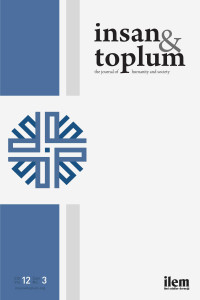Türkiye’de 1990’lı Yıllarda Ortaya Çıkan Siyasi Liberalizm Pratikleri
Liberalizm, Türkiye’de üzerinde en çok konuşulan ideolojilerden biridir. Özellikle Cumhuriyet dönemiyle beraber Türkiye’de, 1990’lı yıllara kadar liberal anlamda bir siyaset pratiği görmek pek mümkün olmamıştır. 1990’lı yıllar ise Türkiye’de ilk defa ve etkin bir manada siyasal liberalizm taleplerinin gündeme getirildiği ve bunu siyaset pratiğinde uygulamaya çalışan YDH ve LDP gibi partilerin, ayrıca düşünce altyapısını kurmaya çalışan “İkinci Cumhuriyetçiler” ve LDT gibi düşünce gruplarının ortaya çıktığı yıllardır. Büyük umutlarla ve söylemlerle Türk siyasal hayatında gündeme gelen siyasal liberalizm talepleri, kısa bir süre içerisinde dar bir çerçeveye sıkışmış ve farklı bir yöne evrilmiştir. Nilüfer Göle’nin haklı tespitiyle “liberal canlanma” olarak adlandırabileceğimiz bu durumu tetikleyen hususlardan bir tanesi 1980’li yıllarda ortaya çıkan sivil toplum arayışları, diğeri ise aynı yıllarda Özal döneminde uygulanan neoliberal politikalar ve bunların siyasetteki ve toplumdaki yansımaları olmuştur. Bununla beraber 1990’lı yıllarda Türk siyasal hayatının ve Türk toplumunun temel gündemini oluşturan meseleler, canlanan bu liberalizmin kısa bir süre içinde tekrardan siyasi sahneden çekilmesine yol açmıştır. Mezkûr yıllarda Kürt ve Alevi sorunu gibi etnik ve kültürel temelli sorunlar, laiklik tartışmaları ve siyasal İslam’ın yükselişi, ayrıca devlet-toplum ilişkilerinde devletin bireye karşı ön plana çıkması gibi gelişmeler de bu liberal canlanmanın kısa süre içinde sahneden çekilmesine yol açan başlıca sebepler olmuştur.
Anahtar Kelimeler:
Liberalizm, Yeni Demokrasi Hareketi (YDH), Liberal Demokrat Parti (LDP), Siyasal Hayat, Türkiye
Political Liberalism in Turkish Politics in the 1990s
Liberalism is one of the most spoken ideology in Turkey. Especially it has not been possible to see political practises as liberal sense in Turkey by the Republican era until 1990’s. In the 1990’s, it is the first time that the political liberalism demands brought an effective sense on the political agenda in Turkey and thus some parties like YDH and LDP and some intellectual groups like “İkinci Cumhuriyetçiler” and LDT emerged by this way. Although came with great expectations and discourses the political liberalism demands in the Turkish political life stucked in a narrow frame and inverted in an different direction in a short time. In this case according to Nilüfer Göle named as “revival of the liberalism” has been triggered by some points. One of the these points is civil society discourses that emerged in the 1980’s, the other one is neoliberal policies in Özal era and their implications in politics and society has become. However the fundamental issues of Turkish society and Turkish political life in these years led to this booming liberalism withdrawal of the politic stage in a short time. Aforementioned years, ethnic-based problems such as Kurdish and Alevi issues, discussions of secularism and the rise of political Islam as well as state-society relations and such as the emergence issues are the main reasons withdrawal of liberalism from the political scene.
Keywords:
Liberalism, New Democracy Movement (NDM), Liberal Democrat Party (LDP), Political Life, Turkey,
___
- Ahmad, F. (2009). Modern Türkiye’nin oluşumu. İstanbul: Kaynak Yayınları.
- Altan, M. (1997). İkinci Cumhuriyet manifestosu tartişmalarina giriş. Doğu Batı Dergisi, 1, 81-93.
- Boaz, D. (1998). Libertarianism. New York: The Free Press.
- Cohen, J. L. Arato, A. (1992). Civil society and political theory. Cambridge: MIT Press.
- Çaha, Ö. (1998). Türkiye’de sivil toplumun sorunlari. Liberal Düşünce Dergisi, 10-11, 26-27.
- Çavdar, T. (1992). Türkiye’de liberalizm (1860-1990). İstanbul: İmge Kitabevi.
- Dubiel, H. (1998). Yeni muhafazakârlik nedir. İstanbul: İletişim Yayınları.
- ISSN: 2146-7099
- Başlangıç: 2011
- Yayıncı: İlmi Etüdler Derneği
Sayıdaki Diğer Makaleler
Şanizade Mehmet Ataullah: Bir Osmanlı Tarih Tasavvur ve Yazımı Örneği
Türkiye’de 1990’lı Yıllarda Ortaya Çıkan Siyasi Liberalizm Pratikleri
İslâm Hukuku ve Pozitif Hukuk Açısından Çocukta Ceza Ehliyeti
2000 Sonrası Türk Dış Politikasının Temel Parametreleri ve Orta Doğu Politikası
Süleyman GÜDER, Muhammed Hüseyin MERCAN
Çevreye Minberden Bakmak: Cuma Hutbelerinde Çevre Sorununun Sunumu
Teori ya da Realite: Hâkim Terapi Kuram ve Uygulamaları Karşısında Konumlanış ve Arayışlar
